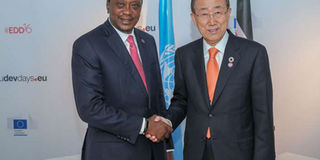We would be better off with a national identity than a tribe

President Uhuru Kenyatta (left) with United Nations Secretary-General Ban Ki-moon on the sidelines of the European Development Days (EDD) at Tour and Taxis in Brussels, Belgium, on June 15, 2016. In Kenya, the President should be a symbol of national identity. PHOTO | NATION MEDIA GROUP
What you need to know:
- Competent and honest leadership does. For the voter, a national, rather than tribal, perspective is a lot more useful.
- After 50 years of trying, we can all agree now that tribalism is not the best way to stability or prosperity.
Ethnic chauvinism is not a smart way to do politics. Let me lay some foundation. In April 2009, lawyers Paul Muite and Maina Kiai wrote an article in Pambazuka News titled Challenging the Kikuyu Oligarchy.
It was a pointed critique of President Mwai Kibaki and his circle of rich and powerful friends. Mr Kiai and Mr Muite occupied an interesting position at the time.
By being critical of “one of their own” and supporting such issues as the Hague, they felt that they were being viewed as “traitors” to their tribe.
The article, in my own reading, was an argument in defence of their political and intellectual position. They made three important points which are worth sharing.
The first and most profound was their passionate argument against the cult of ethnic identity. In Kenyan politics you are your tribe first and foremost; the alpha and omega is where you come from.
The two started their article with an aggressive rejection of that notion. “In Kenya,” they wrote, “politics has hinged on the pre-eminence of ethnic identity since 1964; and today ethnicity has been elevated beyond all other identities and interests. We reject this notion totally and completely.”
And they are right. If you elect a government purely on kinship as opposed to a rational analysis of its ability to deliver on your agenda, or if you elect a person because he is your tribal chieftain and not because of his competence and qualifications, you deligitimise his claim to office because he is not properly elected — he is elected for the wrong reasons.
Tribalism does not serve either the individual or collective interests of the average voter — the one who is not given a big job or cooked tender.
Competent and honest leadership does. For the voter, a national, rather than tribal, perspective is a lot more useful.
The second point was their argument that their (and the people’s) expectations of government remained the same, irrespective of the ethnicity of the President and the clique around him.
“For us”, they thundered, “it does not matter what ethnic group the leadership comes from: We expect and demand a government which has the interests of the nation at heart, which is fair, honest, effective, accountable and transparent”.
The third, and most controversial, was their definition of the oligarchs they saw themselves as challenging.
They dismissed tribal allegiance as “blind ethnic loyalty to decisions made by some wealthy old men (there are no women here) who determine the leadership of the community and convince us, mostly through trickery and fear, to follow”.
After 50 years of trying, we can all agree now that tribalism is not the best way to stability or prosperity.
THE BIGGER PICTURE
A nationalistic attitude and equality before the law are perhaps more viable routes.
Ethnic chauvinism is absurd; one peasant trying to look down his torn shirt on another on account of tribe is plain ridiculous.
John Oucho, in Undercurrents of Ethnic Conflict in Kenya, dismisses the chauvinism of majority tribes, which he says claim the right to live anywhere in the country (even when it disadvantages the minority), believe that the country could not do without them, and entertain a misplaced confidence that if there is war, they will come out on top.
In the same vein, he is critical of parochial minorities’ “faith in the power of warfare funded by a sponsor” and an everlasting “desire to instil fear”.
The competition for power and State resources between the big tribes and the tension between the big tribes and the small ones does not augur well for our common future.
I would think that it makes a lot more sense to invest in a national identity rather than spending so much money, time, and emotion constructing backward and fake ethnic superiorities.
Right now, the country is wracked by tensions arising out of ethnic mobilisation.
Those with grievances are finding comfort and support among primarily their tribesmen and those who feel threatened find solidarity and security in their kinsmen.
It is as if there is no such thing as Kenya. This is a Stone Age approach to important business. Come, be Kenyans first and all these problems will go away.
HIGHLY INAPPROPRIATE
I was an ardent boxing fan in the golden age of pugilism when Mike Tyson ruled the ring with his sledgehammer fists.
Tyson was famous for a killer 1-2 combo, starting with a right hook to the body and a right uppercut to the head that was packed with such powerful fury that it was like being hit by a train.
The rumours in the newsroom tonight — and they are just rumours, NOT facts — are that Senator Mike Sonko swung one at Governor Evans Kidero and it landed and that when the governor counter-punched, the senator blocked.
Our leaders are not supposed to know, leave alone do, things like these. They are supposed to debate with words and reason, not fists.
Should they decide to fight, then they should make it entertaining and productive — put each other in hospital.
[email protected]. Twitter: @mutuma_mathiu





